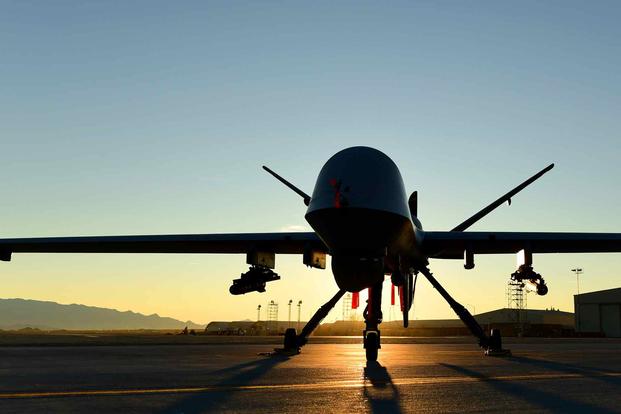Konstantin Toropin

The incidents drew the condemnation of both the Air Force as well as the Pentagon, which released dramatic video of both encounters, while U.S. military officials have vowed to continue flying drones in the region.
Experts who have studied the incidents say that, while Russia has a long history of using these tactics to advance its policy goals, the spike in recent dangerous encounters suggests there's a rising concern among its military about being perceived as weak and ineffectual as the war in Ukraine drags on and a recent mutiny from a top commander raises questions about the country's future.
On Wednesday, the Air Force announced that three of its MQ-9 Reaper drones were harassed by three Russian fighter jets that "dropped multiple parachute flares in front of the drones, forcing our aircraft to conduct evasive maneuvers."
"Additionally, one Russian pilot positioned their aircraft in front of an MQ-9 and engaged [the] afterburner," the service said in a statement.
Then, Thursday evening, the Air Force said that the Russian pilots harassed another set of MQ-9 drones by again dropping flares and flying dangerously close to the aircraft.
Pentagon spokesman Gen. Patrick Ryder stressed at a briefing with reporters Thursday that the two incidents will not stop the mission the drones were all engaged in -- the U.S. military's continued efforts against ISIS.
He also pushed back on the assertion that the U.S. should have done more to avoid the incident.
"We have rules in place -- well-established processes and procedures -- and have very successfully deconflicted with the Russians over many years when it comes to safe operations in that region," Ryder said. "To suggest that somehow this is our fault is ridiculous."
What stands out to experts is the growing pattern of Russian action.
"It's not simply one Russian pilot stepping up line; it's a broader policy that Russia has in order to push us in sensitive areas to signal their displeasure with the American foreign policy," Dr. Raphael Cohen told Military.com in a phone interview Friday.
Cohen, who is the director of the Strategy & Doctrine Program of Project Air Force at Rand Corp., noted that the Russians have been harassing U.S. forces in Syria "for a while now" and the history of such harassment goes back to the Cold War.
"There were unwritten rules of the road that you can mess with each other, but only to some bounds," he explained, before adding that, "as long as you stayed within those bounds, you can be pretty sure that things would stay even keel."
But the recent campaign is showing signs of escalation.
In March, Russian harassment of a U.S. drone led to its downing after an Su-27 aircraft clipped the drone's propeller. That incident prompted Lt. Gen. Alexus Grynkewich, the 9th Air Force (Air Forces Central) commander, to note that "over the course of my career, I have not seen this kind of disregard for agreed-upon protocols and deconfliction rules."
"It's not the kind of behavior I'd expect out of a professional air force," he added.
Russia awarded its pilots medals over the incident. Meanwhile, in mid-June the Air Force said that it was deploying F-22 Raptors to the Middle East in response to the downed drone and several other incidents.
Historically, these provocative incidents seem to have been intended as a message. A 2020 study published by Rand that analyzed many of the previous interactions found that "much of the assertive, dangerous, or unsafe Russian activity appears directed at shaping patterns of ongoing U.S. or allied behavior."
The researchers noted that these provocations were "by definition responsive, not proactive" and that the Kremlin appeared "to be using coercive signals to send targeted compellent messages regarding activities that it finds problematic."
However, Ian Williams, a research fellow for the Center for Strategic & International Studies, says the more recent spike in incidents is tied to current events and the growing understanding that Russia's military is far weaker than previously known.
"We're seeing them being a little more aggressive and greater risk-taking right now because they are trying to offset this perception that they're kind of this paper tiger," Williams said in a phone interview Friday.
To Williams, the choice of Syria also seems deliberate.
"This is related to … trying to prop themselves up and show that they're not shrinking away from these other areas that they see as part of their sphere of influence."
Inside the Pentagon, however, the response will continue to be more transparency and visibility of these incidents.
"We will continue to highlight when the Russians engage in reckless, unprofessional behavior in the skies," Dr. Colin Kahl, the Pentagon's policy boss, said at a press conference Friday.
"We will highlight for the world so that, when and if an incident happens, people will know who's at fault here, and we hope to dissuade the Russians from continuing this pattern of behavior," he added.
-- Thomas Novelly contributed to this report.
No comments:
Post a Comment